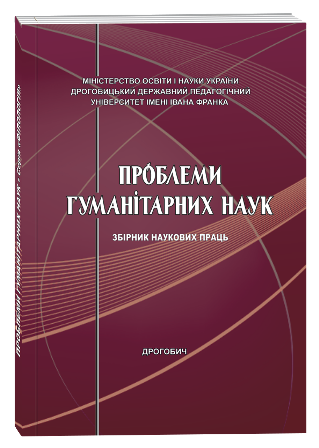INTERJECTION AS A MEANS OF VERBALIZATION OF NEGATIVE EMOTIONS IN MODERN ENGLISH PUBLICISTIC TEXTS
DOI:
https://doi.org/10.24919/2522-4565.2023.57.1Keywords:
interjection, negative emotions, verbalization, pragmatic fullness, alternation, de-semantization.Abstract
Summary. The article focuses on the analysis of monosyllabic interjections as a means of verbalizing negative emotions in modern English-language publicistic texts. Monosyllabic interjections are represented as expressions of the emotional sphere of a human life in modern English publicistic texts. An interjection is defined as a part of speech that does not have an unambiguous interpretation. The Swiss scholar Sh. Bally attributed interjections to exclamatory speech acts and believed that they cannot be called words, since interjections are completely devoid of a mental, logical content. In Ukrainian linguistics, L. Matsko did a detailed research on interjections, who noted that interjections and exclamatory expressions, which include cursings, are informative language units only because they are indicators of an emotional state of a speaker, his attitude to the interlocutor, object or situation speech, its assessments, the essence of an emotional state itself, the content (cause) of the attitude can be revealed only with the help of the semantics of other linguistic units. V. Slipetska singled out the specifics of interaction of interjections with other parts of speech, which is represented in the actualization of relevant alternations, the transition of other parts of speech into interjections due to the loss of relevant lexical meanings and actualization of certain pragmatic information. The nature of meaning of interjections is not focused on semantics, but in pragmatics, the corresponding pragmatic content. In our research three groups of interjections have been singled out depending on their main functional and semantic characteristics: 1) emotions and emotional assessment; 2) verbalization, manifestation of a speaker's will; 3) etiquette. The sample of monosyllabic interjections which verbalize negative emotions of fear, hatred has been compiled, for example: aargh, ah, aha, eek, gee, ugh, etc. Contextual analysis of expressions reveals a wide range of negative emotions and states verbalization.
References
Баллі Ш. Загальне мовознавство та проблеми французької мови. URL : https://maxbook.kiev.ua/ua/p1586115861-balli-obschaya-lingvistika.html.
Война М. О., Воробей О. С., Вороніна М. Ю. Специфіка текстової вербалізації емоцій у китаємовному медійному дискурсі. Вчені записки ТНУ імені В. І. Вернадського. Серія: Філологія. Соціальні комунікації. 2020. Том 31 (70). № 4. Ч. 1. С. 199–207. DOI: https://doi.org/10.32838/2663-6069/2020.4-1/36.
Мацько Л. Інтер’єктави в українській мові. Українська мова в освітньому просторі. Київ : НПУ М. П. Драгоманова, 2009. C. 453–518.
Сліпецька В. Статус вигуку в сучасній науковій парадигмі лінгвістичних знань: проекція на українську, російську й англійську лінгвокультуру. Лінгвістичні студії. 2013. Вип. 27. С. 145–149.
Akkurt V., Korolova T., Popova O. Persuasion prosody in prosecutor’s speech : Ukrainian and English. Amazonia Investiga. 2009. Vol. 10. № 47. P. 125–141. URL : https://doi.org/10.34069/AI/2021.47.11.13.
Koch N., Kaleniuk S. Psycholinguistic Potential of Political Concepts of the Election Campaign (on the example of the slogan-motto “Army. Language. Faith”). Psycholinguistics. 2021. Vol. 30. № 2. P. 153–173. DOI : https://doi.org/10.31470/2309-1797-2021-30-2-153-173.
Majid A. Current emotion research in the language sciences. Emotion review. 2012. Vol. 4. № 4. P. 432–443. URL : https://www.nytimes.com/search?query=aar gh.
Slipetska, V., Bortun K., Zhylin M., Horlachova V. Structure and Semantics of Verbal Means of Expressing States of Emotional Tension in English Publicistic Texts. Amazonia Investiga. 2023. Vol. 12. № 67. P. 212–222. URL : https://amazoniainvestiga.info/inde[.php/amazonia/article/view/2465.
Struhanets L., Zalipska I., Zadorozhna I., Struhanets P., Dashchenko N. The National Television Broadcast Speech Expressiveness as Means of Phychological Influence on the Society. AD ALTA : Journal of Interdisciplinary Research. 2021. Issue 1 (Special XV). P. 41–45. URL : http://dspace.tnpu.edu.ua/handle/123456789/ 24266.
Tomenchuk M., Kotlyarova D. Ways of verbalizing positive human emotions in speech. Věda a perspektivy. 2022. № 12(19). P. 237–243. DOI : https://doi.org/10.52058/2695-1592-2022- 12(19)-237-243.
Washington Post. Search “aargh”. 2022. URL : https://www.washingtonpost.com/search/?qu ery=aargh.



